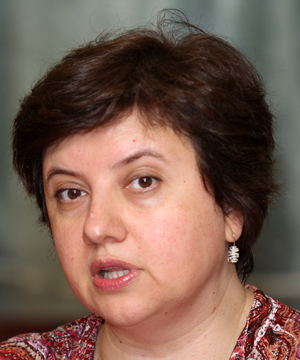During the past 7 years the number of judges per capita in Bulgaria has risen by one third. The average level of increase in countries members of the Council of Europe is 4.2 percent. This requires large-scale restructuring of the judiciary system in Bulgaria. This is one of the findings in a detailed analysis of the World Bank of the Bulgarian judicial system in the period 2008-2014 year.
 "More attention should be paid to the problem with the number of judges,” says Ivanka Ivanova - head of the Law Program of the Open Society Institute. “The demographic structure of the country somehow justifies keeping such a high number of judges. Since 1989 we have been facing very serious processes of internal migration. Most of the population is concentrated in the capital city of Sofia and the big regional centers such as Varna, Burgas, and Plovdiv."
"More attention should be paid to the problem with the number of judges,” says Ivanka Ivanova - head of the Law Program of the Open Society Institute. “The demographic structure of the country somehow justifies keeping such a high number of judges. Since 1989 we have been facing very serious processes of internal migration. Most of the population is concentrated in the capital city of Sofia and the big regional centers such as Varna, Burgas, and Plovdiv."
The report reads that judges in the district courts, as well as in the courts of appeal are far less busy in comparison to judges in the other courts. According to Ivanka Ivanova, it was possible to reduce the number of military courts and courts of appeal. The number of judges cannot be cut because of constitutional guarantees. One option is transferring them to other courts. If offered good career opportunities some may choose to quit and start working in the public administration.
Ivanka Ivanova has focused on three important points in the report.
"It has long been known and WB has confirmed it once again that the delay in proceedings is not a problem in Bulgaria. There are certain exceptional cases of delayed justice, which continue to be the cause for trials against the country in the European Court of Human Rights. However, the World Bank points out that the average duration of litigation is similar to the average level in member countries of the Council of Europe. I think we should not focus on the duration of court proceedings. The World Bank also paid attention to the calls of judges for salary update. A month ago, the judges went into a sharp dispute with the Finance Minister for their salaries. The report of the World Bank shows that there are big delays in payments which must be fixed. The third important point in the report is that the World Bank sees budgeting of the judiciary as a long-term process. According to the bank, in order for the reform in the judiciary to be successful there must be security in relation to the amount of the subsidy received from the state budget. WB also calls for the development of a plan for judicial reform, which is not only the work of the Ministry of Justice or the Supreme Judicial Council. All interested institutions including the Ministries of Justice and Finance should make a joint effort to develop a long-term plan for reforms in the judiciary that are to lead to improved effectiveness of public spending. This is the first time when these three institutions have been asked to combine their expertise in order to come up with a long-term reform plan.”
English: Alexander Markov
The Sofia Zoo has a new resident – an 11-year-old male snow leopard, BNT has reported. He comes from Nordens Ark Zoo, located in Bohuslän, Sweden and is named Araatan. Some time ago, a female leopard arrived from the Helsinki Zoo,..
20 nominees from 11 countries – that is the number of contenders for the “Bulgarian Woman of the Year 2024”, named in honour of Saint Zlata of Meglen . The award has been presented every year since 2009 by the Executive Agency for Bulgarians Abroad..
An initiative committee led by the historian Georgi Markov, has proposed that a monument to Khan Asparuh, the founder of the Bulgarian state, be erected on the site of the former Soviet Army Monument in Sofia, in order to serve as a unifying symbol for..
"Folklore is a need for humans and this need will not disappear just like that, " says Assoc. Prof. Dr. Natalia Rashkova -..
The Sofia Zoo has a new resident – an 11-year-old male snow leopard, BNT has reported. He comes from Nordens Ark Zoo, located in..
Researchers from Bulgaria and abroad are gathering in Sofia for a scientific conference. The forum will be held on October 16 and 17 in..

+359 2 9336 661
